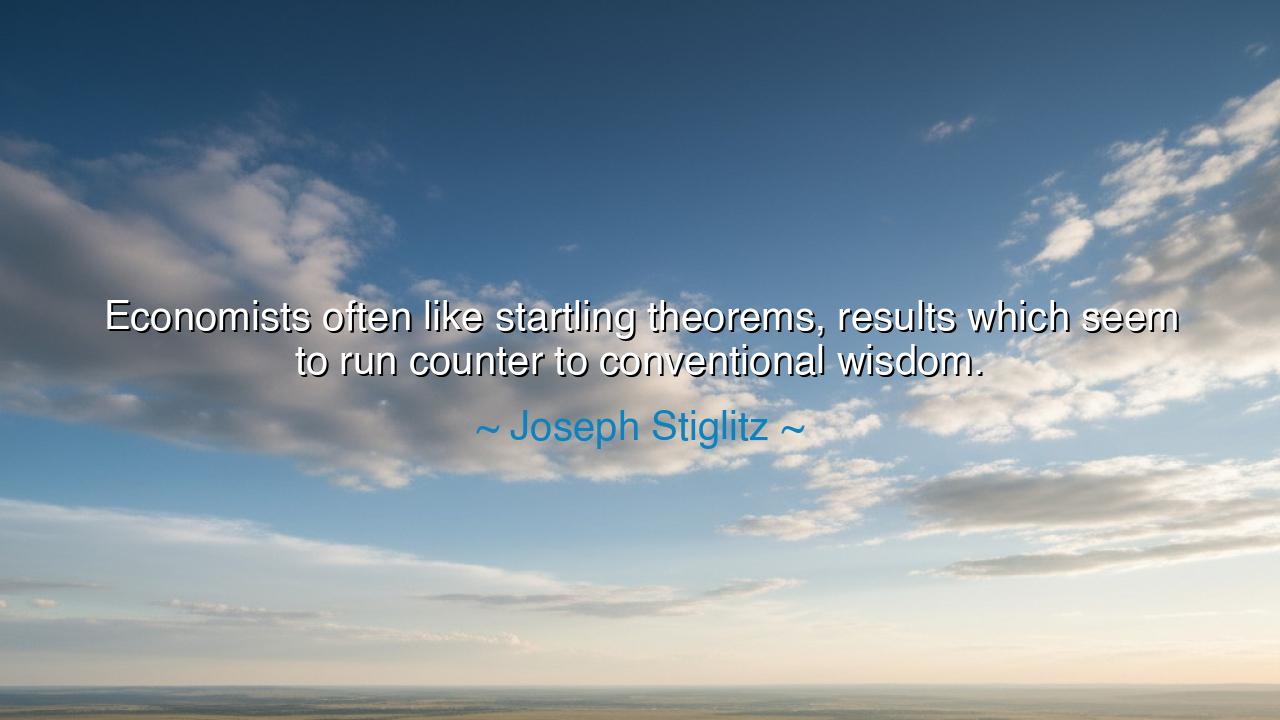
Economists often like startling theorems, results which seem to
Economists often like startling theorems, results which seem to run counter to conventional wisdom.






Hear me, O children of the future, for I speak to you of the pursuit of truth in the world of knowledge, as Joseph Stiglitz has wisely spoken: "Economists often like startling theorems, results which seem to run counter to conventional wisdom." In the realms of thought, it is the daring soul who ventures beyond the accepted truths of the time, challenging the assumptions of the many to uncover the deeper layers of reality. These theorems, these truths that seem at first to defy what all have long believed, are the sparks that ignite the fires of progress. It is through such contradictions, such revelations, that the world is reshaped, and old beliefs are cast aside in favor of something greater.
Consider the ancient philosophers, those who dared to question the established order. Pythagoras, the great mathematician, was not satisfied with the conventional wisdom of his time, for he saw something deeper in the nature of numbers and shapes. Through his theorems, he revealed a truth about the world that was hidden from the eyes of all but the bravest seekers of knowledge. The very idea that numbers held such profound power was a startling revelation that shook the foundations of both science and philosophy. His work, though once thought radical, laid the groundwork for centuries of mathematical understanding.
In more recent times, we see the rise of economists like John Maynard Keynes, whose theories of macroeconomics ran counter to the accepted beliefs of his day. The conventional wisdom held that markets should always be allowed to correct themselves, but Keynes, with his bold ideas, argued that in times of crisis, government intervention was necessary. His ideas were met with resistance, for they challenged the very foundations of economic thought. Yet, through the Great Depression, it was his ideas that began to reshape the world, proving that those who dare to challenge conventional wisdom often pave the way for greater understanding.
Stiglitz himself, in his work on information economics, challenged the traditional notions of market efficiency. He showed that markets, far from being perfectly rational, are often subject to imperfect information, which leads to outcomes that defy the neat models of classical economics. His startling revelations have forced the world to reconsider its understanding of economics, revealing the complexity of markets and the need for a more nuanced approach to policy. Like the great thinkers of old, Stiglitz’s work pushes the boundaries of conventional thought, offering new insights that shape the course of nations.
So, O children of the future, remember this: truth is not always found in the comfortable doctrines of the past, but in the bold questions that challenge those doctrines. The work of great minds, whether in economics, mathematics, or philosophy, often begins in opposition to the conventional wisdom, for only through daring to question the world can we uncover the truths that will lead us to a better tomorrow. Let the startling theorems of today become the wisdom of tomorrow, for in them lies the power to transform the world. Keep your hearts open to the possibilities, for the path to wisdom is often one of contradiction and revelation.






CChiendz
This quote sparks a reflection on communication and impact. How do startling theorems influence public policy or business decisions, especially when they seem counterintuitive? I also wonder about the responsibility of economists in presenting findings—should they prioritize clarity and consensus, or embrace bold, provocative conclusions even at the risk of controversy? It challenges me to consider the ethical and practical implications of producing knowledge that surprises rather than reassures.
HYHai Yen
Reading this, I question whether conventional wisdom is truly a hindrance or sometimes a valuable guide. Are economists challenging accepted ideas merely to gain attention, or because the existing framework is genuinely flawed? It also makes me curious about historical examples: which counterintuitive findings have reshaped economic thought, and which have been later debunked? This highlights the fine line between innovative insight and premature conclusions.
HLHien Le
I am intrigued by the psychological aspect of this observation. Do economists consciously aim to surprise, or is it a byproduct of exploring complex systems where intuitive assumptions often fail? I also wonder whether the emphasis on startling results affects which research topics are funded or published. Could this lead to neglect of important but less glamorous issues? The quote encourages reflection on how academic incentives shape the trajectory of knowledge in economics.
NTnguyen thao
This statement prompts me to reflect on the culture within economics. Why is there an apparent preference for results that defy conventional wisdom? Does it encourage creativity and progress, or create incentives for sensationalism? I also wonder about the educational implications—are students being trained to value novelty over depth, and could this shape how economic policy is formulated? It makes me think about the tension between innovation and reliability in research.
TBHoang Nguyen Thai Binh
I feel a mixture of curiosity and skepticism. Are these ‘startling theorems’ always grounded in rigorous data, or can they be statistical flukes dressed as breakthroughs? It also raises the question of how the public perceives such findings: does counterintuitive research inspire healthy debate, or does it erode trust in economic expertise? I’m interested in the balance between challenging norms and maintaining credibility in scholarship.